When you're diving into the world of microservices, whether you're actively preparing for an interview or just trying to brush up on key concepts, having the right resources makes all the difference. Microservices have become the backbone of modern application architecture, and understanding the ins and outs of it is crucial for anyone looking to stay relevant in the tech world.

So, what do you need to know when it comes to microservice interview questions, especially after years in the field? It’s not just about the basics anymore—it's about demonstrating a deep, practical understanding. A lot of professionals who’ve spent a decade or more in the industry are expected to handle complex, distributed systems with ease. But how do you prove that in an interview? Let's break down some essential areas you might encounter.
For starters, expect questions about service decomposition. How do you decide which parts of an application should be split into separate services? It’s not just a theoretical question—it’s about showing you can manage scalability, reliability, and independent development of different service components. For instance, let's say you're working on an e-commerce platform. How would you split services for the user cart, payment gateway, and product catalog? The interviewer is looking for a clear explanation of how you would tackle service boundaries, handle inter-service communication, and ensure each service is independently scalable.
Then there’s data management in a microservice architecture. In a system where each service has its own database, how do you ensure data consistency? Some might lean on event-driven architecture or eventual consistency, but it’s important to explain why one approach might be better suited for a particular situation than another. Maybe you’d opt for a more transactional approach when handling payment-related services, or perhaps an event-driven solution when dealing with product inventory. The key here is flexibility and knowing when to apply each pattern.
Testing and deployment are also big talking points. Microservices might sound great in theory, but they come with their own set of challenges. For example, how do you ensure smooth testing when services interact with each other? It’s crucial to talk about integration testing and how tools like Docker and Kubernetes can make deployment a lot smoother, even in large systems.
In a more practical sense, it’s also about your problem-solving approach. Interviewers might ask about a situation where microservices caused a problem, and how you would approach debugging or resolving it. Let’s say the payment system suddenly crashes, but other services like inventory management are unaffected. How would you isolate the problem, identify whether it’s a code issue or a resource allocation issue, and fix it without impacting other services? This showcases your experience with real-world problem-solving.
One important thing to remember when tackling these questions is that microservices are as much about the big picture as they are about detail. Yes, you need to understand how to break an app down into smaller services and handle issues like fault tolerance and service discovery. But you also need to have a solid grasp of what each service does in context and how it fits into the overall application. This is where depth of experience truly shines—being able to talk about trade-offs, decision-making processes, and lessons learned from past projects is what will set you apart.
In the end, preparation is key. It’s about not just understanding theory but also having the confidence and the practical knowledge to speak about it with clarity and conviction. Whether you're deep into microservices already or just brushing up, these are the sorts of questions and scenarios you'll face. By understanding the nuances and being able to confidently tackle them, you'll position yourself as someone who not only knows microservices but also knows how to apply them in real-world, dynamic environments.
Established in 2005, Kpower has been dedicated to a professional compact motion unit manufacturer, headquartered in Dongguan, Guangdong Province, China. Leveraging innovations in modular drive technology, Kpower integrates high-performance motors, precision reducers, and multi-protocol control systems to provide efficient and customized smart drive system solutions. Kpower has delivered professional drive system solutions to over 500 enterprise clients globally with products covering various fields such as Smart Home Systems, Automatic Electronics, Robotics, Precision Agriculture, Drones, and Industrial Automation.




































